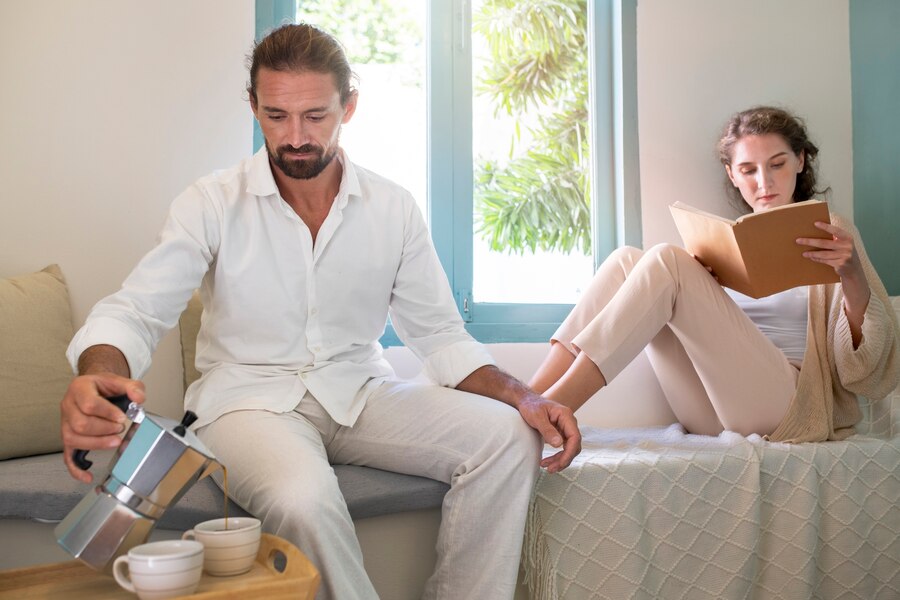Trauma-Informed Couples Treatment Approaches
When Bea and Marcus first walked into Couples Rehabs, their relationship hung by a thread. Marcus’s combat-related PTSD triggered explosive arguments, while Bea’s childhood trauma made her withdraw into protective silence. Their love remained strong, but trauma had built invisible walls between them.
Their story isn’t unique. Trauma-informed couples treatment approaches have emerged as revolutionary methods for helping partners navigate the complex intersection of individual healing and relationship repair. At Couples Rehabs, we’ve witnessed countless couples transform their pain into profound connection through specialized therapeutic interventions.
The statistics are sobering yet hopeful. Research indicates that 70% of adults experience at least one traumatic event during their lifetime, and these experiences inevitably impact intimate relationships. However, couples who engage in trauma-informed therapy show remarkable improvement rates, with studies demonstrating 85% success in reducing relationship distress when both partners commit to the healing process.
Understanding Trauma’s Impact on Intimate Relationships
The Hidden Wounds That Divide Us
Trauma doesn’t just affect individuals—it creates ripple effects that touch every aspect of a relationship. When one or both partners carry unresolved trauma, their nervous systems remain hypervigilant, interpreting normal relationship stress as existential threats.
Emotional dysregulation becomes the norm rather than the exception. Partners may experience:
- Sudden mood swings that seem disproportionate to current circumstances
- Difficulty distinguishing between past threats and present safety
- Overwhelming fear of abandonment or engulfment
- Physical symptoms like racing hearts, shallow breathing, or chronic tension
At Couples Rehabs, our clinicians recognize that traditional couples therapy approaches often fall short when trauma is present. Trauma-informed couples treatment approaches require specialized understanding of how the nervous system responds to perceived threats, even within loving relationships.
The Neuroscience Behind Relationship Trauma
Recent advances in neuroscience have revolutionized our understanding of trauma’s impact on relationships. The amygdala—our brain’s alarm system—becomes hyperactive in trauma survivors, triggering fight-or-flight responses during normal relationship conflicts.
Dr. Daniel Siegel’s research on interpersonal neurobiology reveals that trauma literally rewires the brain’s capacity for connection. The areas responsible for:
- Executive functioning (planning, decision-making)
- Emotional regulation (managing intense feelings)
- Memory integration (connecting past and present experiences)
- Social engagement (reading facial expressions, vocal tones)
All become compromised, making intimate relationships feel simultaneously essential and terrifying.
Core Principles of Trauma-Informed Couples Treatment
Safety as the Foundation
Every effective trauma-informed couples treatment approach begins with establishing safety—both physical and emotional. At Couples Rehabs, our therapists create structured environments where both partners can begin to regulate their nervous systems.
Physical safety involves:
- Clear boundaries around aggressive behavior
- Safe words for de-escalating intense moments
- Structured communication protocols
- Designated cooling-off periods when needed
Emotional safety encompasses:
- Validation of each partner’s trauma experiences
- Non-judgmental exploration of triggers
- Collaborative development of coping strategies
- Consistent therapeutic boundaries and expectations
Recognizing Trauma Responses vs. Character Flaws
One of the most transformative aspects of trauma-informed couples treatment approaches is helping partners understand that many relationship difficulties stem from trauma responses rather than personality defects or lack of love.
When James would suddenly become silent and withdrawn during discussions about their future, his wife Lisa initially interpreted this as disinterest or rejection. Through trauma-informed therapy at Couples Rehabs, they discovered that James’s childhood experiences with an unpredictable, explosive father had programmed his nervous system to shut down during any perceived conflict.
This reframe from “He doesn’t care” to “His nervous system is protecting him” opened space for compassion and collaborative healing.
Evidence-Based Trauma-Informed Treatment Modalities
Emotionally Focused Therapy (EFT) for Complex Trauma in Partnerships
Emotionally focused therapy (EFT) for complex trauma in partnerships represents one of the most researched and effective approaches for trauma-affected couples. Developed by Dr. Sue Johnson, EFT combines attachment theory with experiential therapy techniques.
The three-stage EFT process specifically adapted for trauma includes:
Stage 1: De-escalation and Stabilization
- Identifying negative interaction cycles perpetuated by trauma responses
- Mapping how past wounds trigger present conflicts
- Developing emotional awareness and regulation skills
- Creating safety through structured interactions
Stage 2: Restructuring Traumatic Bonds
- Accessing underlying attachment emotions beneath trauma responses
- Facilitating corrective emotional experiences between partners
- Processing traumatic material within the safety of the relationship
- Building new neural pathways for secure connection
Stage 3: Integration and Consolidation
- Practicing new communication patterns
- Developing relapse prevention strategies
- Strengthening the couple’s capacity to co-regulate emotions
- Creating shared narratives that integrate trauma and healing
Research demonstrates that EFT achieves 70-73% recovery rates for distressed couples, with particularly strong outcomes for trauma-affected partnerships when delivered by trained clinicians.
Attachment-Based Trauma Therapy for Couples
Attachment-based trauma therapy for couples recognizes that our earliest relationships create templates for all future intimate connections. When childhood trauma disrupts healthy attachment development, adult relationships become battlegrounds between the need for connection and the fear of vulnerability.
At Couples Rehabs, our attachment-focused interventions include:
Identifying Attachment Styles
- Secure attachment: Comfortable with intimacy and independence
- Anxious attachment: Craves closeness but fears abandonment
- Avoidant attachment: Values independence but struggles with emotional intimacy
- Disorganized attachment: Wants closeness but finds it overwhelming or frightening
Healing Attachment Wounds Partners learn to recognize when their attachment systems become activated and develop strategies for:
- Communicating attachment needs clearly
- Providing reassurance and comfort
- Tolerating emotional intensity without withdrawing
- Creating secure base behaviors that promote safety
Somatic Experiencing for Couples Dealing with Past Trauma
Traditional talk therapy, while valuable, sometimes cannot reach the deepest layers of trauma stored in the body. Somatic experiencing for couples dealing with past trauma addresses the physiological impacts of traumatic experiences through body-awareness techniques.
Developed by Dr. Peter Levine, somatic experiencing helps couples:
Recognize Bodily Trauma Responses
- Chronic muscle tension or pain
- Shallow breathing patterns
- Digestive issues or appetite changes
- Sleep disturbances or hypervigilance
- Dissociation or feeling “checked out”
Develop Body-Based Coping Skills Partners learn techniques such as:
- Grounding exercises that anchor awareness in the present moment
- Breathing practices that activate the parasympathetic nervous system
- Progressive muscle relaxation to release stored tension
- Mindful movement that reconnects mind and body
- Co-regulation practices that help partners calm each other’s nervous systems
Couples Therapy for PTSD in Relationships
Couples therapy for PTSD in relationships requires specialized protocols that address the unique challenges posed by post-traumatic stress disorder. PTSD symptoms—including intrusive memories, emotional numbing, hypervigilance, and avoidance—can severely strain intimate partnerships.
At Couples Rehabs, our PTSD-informed couples therapy includes:
Psychoeducation About PTSD Both partners learn about:
- How PTSD symptoms manifest in daily life
- The difference between traumatic memories and present reality
- How hypervigilance affects relationship dynamics
- Why emotional numbing occurs and what it means
- Effective ways to support a partner during flashbacks or panic attacks
Trauma Processing Within Relationship Context Unlike individual PTSD treatment, couples-based approaches help partners:
- Share traumatic experiences at appropriate paces
- Develop mutual understanding and empathy
- Address secondary trauma in non-PTSD partners
- Create relationship rituals that promote safety and connection
- Build communication skills specific to trauma-related challenges
Specialized Approaches for Complex Relationship Trauma
Rebuilding Trust After Infidelity and Trauma in Marriage
Rebuilding trust after infidelity and trauma in marriage presents unique challenges that require sophisticated therapeutic interventions. When infidelity occurs within the context of existing trauma, the betrayal can trigger profound re-traumatization.
The process involves several critical phases:
Crisis Stabilization
- Ensuring physical and emotional safety for both partners
- Addressing immediate trauma symptoms
- Establishing clear boundaries and expectations
- Preventing further traumatic disclosures or discoveries
Truth-Telling and Accountability
- Creating structured opportunities for full disclosure
- Helping the unfaithful partner understand trauma impacts
- Processing the betrayed partner’s trauma responses
- Developing accountability measures that promote healing
Forgiveness and Reconciliation
- Distinguishing between forgiveness and reconciliation
- Processing grief and loss associated with relationship betrayal
- Building new relationship structures based on transparency
- Creating shared meaning from the crisis experience
Managing Triggers in Couples with a Trauma History
Managing triggers in couples with a trauma history requires both partners to develop sophisticated emotional regulation skills and mutual support strategies.
Trigger Identification and Mapping Couples learn to recognize:
- Environmental triggers (sounds, smells, locations)
- Interpersonal triggers (tones of voice, facial expressions, body language)
- Seasonal or anniversary triggers
- Internal triggers (emotions, body sensations, thoughts)
De-escalation Strategies Effective trigger management includes:
- Pre-arranged signals that indicate rising activation
- Time-out protocols that prevent escalation
- Grounding techniques that restore present-moment awareness
- Comfort measures that provide reassurance and safety
- Follow-up conversations that process triggered episodes
Healing Relationship Trauma Through Counseling
Healing relationship trauma through counseling at Couples Rehabs involves comprehensive approaches that address both individual healing and relationship repair simultaneously.
Individual Trauma Work Within Couples Context
- Processing personal trauma history and its relationship impacts
- Developing individual coping skills and emotional regulation
- Addressing trauma-related symptoms like depression, anxiety, or PTSD
- Building self-awareness and emotional intelligence
Relational Trauma Healing
- Identifying and addressing relationship-specific traumatic experiences
- Processing betrayals, abandonments, or emotional injuries within the partnership
- Developing new relationship patterns that promote healing
- Creating corrective emotional experiences that rewire traumatic associations
Supporting Partners Through Complex Trauma Recovery
How to Support a Partner with Childhood Trauma in a Relationship
How to support a partner with childhood trauma in a relationship requires understanding, patience, and specific skills that promote healing rather than inadvertent re-traumatization.
Understanding Childhood Trauma’s Lasting Impact Partners of childhood trauma survivors learn about:
- How early experiences shape adult relationship expectations
- Why certain behaviors or situations trigger intense reactions
- The difference between trauma responses and personal attacks
- How healing happens gradually and non-linearly
Practical Support Strategies Supportive partners develop skills in:
- Emotional co-regulation: Helping their partner return to calm states during activation
- Consistent availability: Providing reliable emotional presence without becoming codependent
- Boundary respect: Understanding when to offer support and when to step back
- Patience with the process: Accepting that healing takes time and involves setbacks
Creating Trauma-Informed Relationship Environments
Couples learn to create home environments that support ongoing trauma recovery:
Physical Environment Modifications
- Ensuring adequate lighting and minimal startling noises
- Creating designated safe spaces for emotional regulation
- Removing or modifying trauma-related triggers in the home
- Establishing predictable routines that promote nervous system regulation
Emotional Environment Cultivation
- Practicing unconditional positive regard for each other’s healing journey
- Celebrating small victories and progress milestones
- Maintaining hope during difficult periods
- Building community support systems that understand trauma recovery

Modern Approaches: Online Trauma-Informed Couples Counseling
Online Trauma-Informed Couples Counseling for Long-Distance Relationships
Online trauma-informed couples counseling for long-distance relationships has emerged as a vital service, especially following the COVID-19 pandemic. Couples Rehabs has developed specialized protocols for delivering effective trauma therapy through digital platforms.
Advantages of Online Trauma-Informed Therapy
- Accessibility: Couples can access specialized trauma therapists regardless of geographic location
- Comfort: Partners may feel safer discussing traumatic experiences from familiar environments
- Flexibility: Scheduling becomes easier for couples managing trauma symptoms and daily responsibilities
- Continuity: Therapy can continue during travel, illness, or other disruptions
Ensuring Effectiveness in Digital Formats Online trauma therapy requires specific adaptations:
- Technology preparation: Ensuring stable internet connections and private spaces
- Safety protocols: Establishing emergency contacts and crisis intervention procedures
- Engagement techniques: Using interactive tools that maintain connection despite physical distance
- Progress monitoring: Regular check-ins and assessment tools adapted for remote delivery
Integrating Technology with Trauma Recovery
Modern trauma-informed couples therapy incorporates various technological tools:
Mobile Apps for Daily Support
- Couple’s communication apps with built-in de-escalation tools
- Mindfulness and grounding exercise applications
- Mood tracking systems that help identify trigger patterns
- Emergency contact systems for crisis situations
Virtual Reality Applications Emerging VR technologies offer:
- Exposure therapy for specific trauma-related fears
- Immersive relaxation environments for nervous system regulation
- Safe spaces for practicing difficult conversations
- Graduated exposure to triggering situations within controlled environments
The Role of Family Systems in Trauma Recovery
Understanding Intergenerational Trauma Patterns
Trauma often passes through family systems across generations, creating complex patterns that affect multiple relationships simultaneously. At Couples Rehabs, we recognize that healing individual couples often requires understanding broader family trauma dynamics.
Identifying Generational Patterns Couples explore how trauma has moved through their families:
- Recurring relationship conflicts or themes
- Similar coping mechanisms across generations
- Unspoken family rules about emotions or conflict
- Repeated patterns of abandonment, abuse, or neglect
- Cultural or historical trauma impacts
Breaking Cycles of Trauma Transmission Partners learn to:
- Recognize inherited trauma responses
- Develop conscious parenting approaches that promote security
- Address their own childhood experiences to prevent passing trauma to their children
- Create new family traditions that support healing and connection
Involving Extended Family in Healing Process
When appropriate and safe, trauma-informed couples therapy may include extended family members:
Family-of-Origin Work
- Processing childhood experiences with surviving family members
- Setting new boundaries with family systems that perpetuate trauma
- Healing relationships with parents or siblings when possible
- Addressing loyalty conflicts between family-of-origin and current partnership
Creating Chosen Family Systems For couples whose biological families cannot provide safety or support:
- Building supportive community networks
- Developing mentor relationships with healthy couples
- Creating rituals and traditions that support their healing journey
- Establishing new definitions of family based on mutual support and growth
Measuring Progress in Trauma-Informed Couples Therapy
Assessment Tools and Metrics
Effective trauma-informed couples therapy requires ongoing assessment of progress across multiple domains:
Individual Trauma Symptom Reduction
- Decreased frequency and intensity of trauma symptoms
- Improved emotional regulation and stress management
- Better sleep quality and physical health indicators
- Increased capacity for present-moment awareness
Relationship Quality Improvements
- Enhanced communication and conflict resolution skills
- Increased emotional and physical intimacy
- Greater mutual support and understanding
- Improved collaborative problem-solving abilities
Nervous System Regulation
- Reduced reactivity to relationship triggers
- Improved co-regulation between partners
- Better recovery time from conflict or stress
- Increased overall sense of safety and security
Long-Term Recovery Indicators
Successful trauma-informed couples therapy creates lasting changes that extend beyond symptom reduction:
Resilience Building Couples develop the capacity to:
- Navigate future stressors without falling into old trauma patterns
- Support each other through life transitions and challenges
- Maintain connection during difficult periods
- Seek appropriate help when needed
Post-Traumatic Growth Many couples experience growth beyond their pre-trauma functioning:
- Deeper emotional intimacy and understanding
- Greater appreciation for their relationship and each other
- Enhanced empathy and compassion
- Stronger sense of shared purpose and meaning
Conclusion: Transforming Pain into Connection
The journey through trauma-informed couples treatment approaches is rarely linear or easy, but it offers profound possibilities for healing and growth. At Couples Rehabs, we’ve witnessed countless couples transform their deepest wounds into sources of strength and connection.
Trauma-informed couples treatment approaches recognize that healing happens in relationship—that the very connections wounded by trauma can become pathways to recovery. When partners commit to understanding each other’s pain and supporting each other’s healing, they create possibilities for transformation that extend far beyond their individual lives.
The integration of couples therapy for PTSD in relationships, healing relationship trauma through counseling, attachment-based trauma therapy for couples, and other specialized approaches offers hope for even the most challenging relationship situations. Whether addressing rebuilding trust after infidelity and trauma in marriage or supporting partners through childhood trauma recovery, these evidence-based interventions provide roadmaps for healing.
For couples considering trauma-informed therapy, remember that seeking help represents courage, not weakness. The decision to face trauma together, with professional support, opens doors to healing that might otherwise remain closed. At Couples Rehabs, we’re honored to walk alongside couples on these transformative journeys, providing the expertise, compassion, and hope necessary for true healing to occur.
The path forward may be challenging, but it leads toward connection, understanding, and the possibility of a relationship that’s not just healed, but stronger than it was before trauma entered your lives. Your love story deserves this investment in healing and growth. Contact us today to schedule your confidential consultation and take the first step toward transforming your relationship’s greatest challenges into its greatest strengths.
Frequently Asked Questions About Trauma-Informed Couples Treatment
What makes couples therapy “trauma-informed”?
Trauma-informed couples therapy differs from traditional approaches by prioritizing safety, recognizing trauma symptoms as adaptive responses rather than relationship problems, and using specialized techniques that account for how trauma affects the nervous system, memory, and attachment patterns.
How long does trauma-informed couples therapy take?
The duration varies significantly based on trauma complexity, relationship history, and individual healing needs. Most couples engage in therapy for 6-18 months, with some requiring longer-term support for complex trauma recovery.
Can couples therapy help if only one partner has trauma?
Absolutely. Trauma affects relationship dynamics even when only one partner is directly impacted. Both partners benefit from understanding trauma’s effects and developing skills to support healing and strengthen their connection.
What if my partner isn’t ready to address their trauma?
Trauma recovery cannot be forced. However, the non-traumatized partner can develop skills to create safer relationship environments, set healthy boundaries, and encourage professional support without pressuring their partner.
Is it safe to process trauma together as a couple?
When conducted by trained trauma specialists, couples therapy provides a safe container for trauma processing. Therapists carefully assess readiness and use specialized techniques that prevent re-traumatization while promoting healing.
How do I know if we need trauma-informed therapy vs. regular couples counseling?
Consider trauma-informed approaches if your relationship involves: flashbacks or panic attacks, extreme emotional reactions that seem disproportionate, avoidance of intimacy or conflict, substance abuse, history of abuse or neglect, military combat exposure, or significant losses or betrayals.















Recent Comments